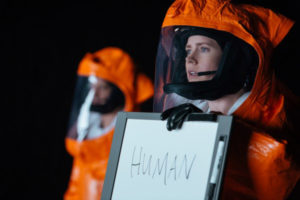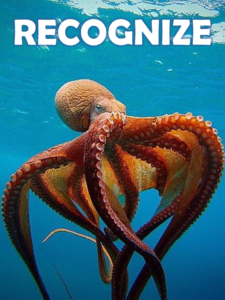 Two things have been bouncing off each other in my head for a while now. One is the bestselling The Soul of an Octopus by naturalist Sy Montgomery, which explores the psychology and individual personalities of that most intelligent of molluscs, the octopus. The other is the film The Arrival, in which a linguist is assigned to kick off communications with an alien species that strongly resembles the octopus. Having only seven arms, however, they’re called heptapods.
Two things have been bouncing off each other in my head for a while now. One is the bestselling The Soul of an Octopus by naturalist Sy Montgomery, which explores the psychology and individual personalities of that most intelligent of molluscs, the octopus. The other is the film The Arrival, in which a linguist is assigned to kick off communications with an alien species that strongly resembles the octopus. Having only seven arms, however, they’re called heptapods.
I was particularly troubled by a piece in Popular Science that draws on linguistics professor Jessica Coon, who was consulted on the film, which goes in a lot of screwy directions in its thinking about life, grammar, and communication. Bottom line upfront, Coon seems to think that language is somewhat arbitrarily constructed and therefore we can expect a tough slog trying to communicate with aliens.
I think that a comparative psychologist, who studies the relationships between human and non-human cognition in Earth-based life, might give you a more realistic view of how the universe constructs things (it’s far from arbitrary) and thus a far more optimistic view of our chances at communicating with extraterrestrial intelligence.
Getting the rant out of the way
I’ll go ahead and say that I spent a lot of time yelling at the screen during The Arrival. (I was streaming it at home, so it’s okay. Except maybe to my neighbors.)
It wasn’t just the weirdly super-powered Whorfianism behind the plot: learn a new language, break the laws of physics with your mind! This is literally how Medieval occultists thought with their angel-binding names and magical words. Abracadabra! This is fine for fantasy stories, but The Arrival is ostensibly science fiction.
But, like I said, it was not just that. It was also the very bad steps the lead character, linguist Louise Banks, takes toward communicating with the aliens, and the utter ineptness of the presumably technologically advanced aliens in doing much of anything to help out.
The idea that, in such an encounter, humans would be the ones decoding and presenting the aliens’ language back to them is beyond hubris. The humans in The Arrival have whiteboards and computer displays and pattern-finding algorithms. The aliens just keep spitting on the window, like idiotic tourists who speak their own language louder when trying to be understood in a foreign country. For all the advanced technology that got them to Earth, they don’t even have a chalkboard, much less a professional linguist.
“You’ve got to be fucking kidding me,” came out of my mouth more than once.
 But, when Banks starts scribbling English words onto a whiteboard, I just laughed. “Oh, of course, let’s use the most confusingly and incoherently spelled language on the entire fucking planet.” English spelling is so baffling that its inconsistencies spawn memes! Literally any other language would have been better. Chinese would have been much better, despite the number of logograms, because there is a single thread connecting spoken word to symbol, just as there is between spoken word and concept.
But, when Banks starts scribbling English words onto a whiteboard, I just laughed. “Oh, of course, let’s use the most confusingly and incoherently spelled language on the entire fucking planet.” English spelling is so baffling that its inconsistencies spawn memes! Literally any other language would have been better. Chinese would have been much better, despite the number of logograms, because there is a single thread connecting spoken word to symbol, just as there is between spoken word and concept.
Alphabets make representing the sounds made by a human mouth much simpler than a logographic writing system, but that virtue would mean nothing talking to alien heptapods. It would just add a layer of translation between sound and symbol. This helps organize things for creatures that verbalize like humans (so, it might work with parrots and ravens) but the heptapods would have no biolinguistic context. It would just be arbitrary and meaningless complexity to them.
Alphabets would be a bad choice even for languages with consistent rules of spelling, like Spanish and Hawaiian. But, English? It’s a muzzle-fuzzle nightmare! And anyone who knows anything about any language other than English would know this. A professional linguist should know this.
Okay, now more to the point
But, my issues with this film (and with the PopSci piece on the consultant) dig down further, into the basic concepts of language and cognition being bandied about here. Given the infatuation with Sapir-Whorf relativism, it shouldn’t surprise me that the film and its linguistic consultant seem to believe that language is constructed arbitrarily. But the backwardness doesn’t stop there.
The PopSci piece paraphrases the film’s lead character, Louise Banks:
[I]f an alien species acts instinctively their language may have no concept of self-will, or no way to distinguish between doing things on purpose as opposed to by accident.
First of all, let’s be practical. How the hell could a species that can’t distinguish between what it meant to do and what it accidentally did ever learn or figure out anything at all, much less develop any kind of technology? Much less travel between star systems…
Just… go find a trained engineer or hard science researcher and run that idea by him. A creature that can’t tell when something is intentional or accidental develops an advanced technological civilization. When he or she stops laughing, ask why that makes no sense. (Hopefully, most of you have already figured it out on your own.)
But, secondly, this idea of non-humans relying on “instinct” (presumed to be mutually exclusive with reason or free will) is not just a sci-fi faux pas. It’s a tiresome philosophical boogeyman that haunted science for decades.
Raise your hand if you thought the Magical Human of behaviorism was dead and gone. Well, he’s not. He’s still out there whispering his narcissistic bullshit to himself. “In the whole of the universe, only I have consciousness and emotions and reason and free will. Every other creature is just an instinctual automaton, reacting insensibly to stimuli.”
Decades of research into the psychology of animals should have embarrassed this sociopathic philosophy into oblivion, but it still keeps lifting a finger as if to make an innocent suggestion: “If we can’t get inside the other creature’s head, how can we assume they also have feelings and thoughts and intention? Occam’s Razor, right?”
But, why would we see two similar phenomena and assume they had two utterly different underlying causes? Occam’s Razor would suggest that if two animals, one human and one not human, both display fear, or interest, or pessimism, it’s most likely the same thing going on inside. Unless we assume humans are just Special for some utterly arbitrary reason.
The building blocks of language
 It gets even more weird. The PopSci piece draws us deeper into Coon’s thinking:
It gets even more weird. The PopSci piece draws us deeper into Coon’s thinking:
If aliens ever do touch down on Earth, their language is likely to offer challenges not found in any human language. “What linguists have discovered about human languages is that even though they can sound very different from one another and their grammars do show a lot of variation…languages tend to fall into certain patterns,” Coon says. So given certain pieces of information about a human language, linguists can often make reliable predictions about its other properties.
Take word order. In languages where verbs come before objects, it’s also common for prepositions like “on” to precede nouns. So in English, we say, “ate the apple,” and, “on the table.” In other languages, such as Japanese, both patterns are reversed. “Most of the world’s languages fall into one of those patterns or the other,” Coon says. “The variation isn’t completely unconstrained.”
Alien languages are unlikely to follow the same rules that human languages share. “Humans seem to be hardwired for this capacity to learn language,” Coon says. “Because it is part of our genetics and part of being human, it’s very unlikely that other creatures…would have the same kinds of constraints or show the same kinds of similarities that human languages do.”
Okay, first up, when you’re talking about prepositions as opposed to postpositions (what Japanese and Hindi have) the inclusive, neutral, professional term is adposition. Prepositions precede their objects, postpositions follow them. Not to be nitpicky, and I wouldn’t care really except that this article was published in a science magazine and is ABOUT $%#$ LANGUAGE!
And, why would alien languages not fall into the same pattern human languages do, i.e., “with both verbs and adpositions, either object first or object last”?
Yes, object is a grammatical term referring to the use of nouns, but objects are also physical objects, to which the simplest and most common types of nouns refer. “Rock” and “tool” and “weapon.” Similarly, the simplest and most common adpositions describe spatial relationships to objects. “Near” and “toward” and “on.” Similarly, the simplest and most common verbs describe transformations and movements (like “eat” and “flee” and “dissolve”) that any intelligent creature would share with humans.
If aliens live in the same universe we do (they do) with objects and spatial relationships and transformations and movements, why would we just assume their languages would bend away from rather than converge on the adaptations human languages have evolved in order to communicate about objects, space, energy, and time?
Coon thinks that these patterns are something special to humans, because … well, because I don’t really know why and she’s really not clear. Because humans are Special and Magical?
Why Coon seems to think that an advanced alien species would not also be “hardwired for this capacity to learn language,” why language wouldn’t be “part of [their] genetics,” why it wouldn’t be “part of being [insert advanced alien species here],” I honestly can’t tell you. Mountains of evidence in convergent evolution show otherwise. Insects, birds, and bats all are hardwired for the capacity for flight despite evolving flight separately. One might reasonably assume the same about alien creatures that fly.
And, I cannot even think of a creature that does not, in some way, communicate. Plants communicate with each other. Bacteria communicate with each other. Language is a particularly complicated mode of communication, but it’s not magic. Evolution found it once. Why would it not find it again and hardwire it into the brain of another, non-human, even extraterrestrial creature?
Because humans are Special and Magical?
And, why would that language not follow patterns similar to those human languages follow? The idea that evolution would follow a convergent, adaptive path toward flight or language or whatever, but then for some reason there would be no convergent adaptive paths on the other side of that achievement… it just strains credulity.
Once you get to something like language that is perceived as a Defining Human Characteristic, suddenly the laws of nature stop working? Why would it be “unlikely” that alien languages would follow rules similar to those human languages follow? Why would convergent evolutionary pressures just evaporate once language evolves?
I don’t think they would. I think we might find some truly bizarre means of communication out there in the universe (including maybe here on our own planet) but once you get past the medium that carries the language I think that not only will those languages follow patterns similar to the ones we see in human languages, but that the underlying consciousness that expresses itself through those languages may be more similar to ours than some think.
Why? Let’s check out the evidence…
The building blocks of cognition
 From the bottom up, the universe loves patterns.
From the bottom up, the universe loves patterns.
Put a few electrons, protons, and neutrons together and the universe will give you a constrained set of elements that interact in a constrained set of ways. Put those elements together, and the universe will give you a constrained set of chemicals that interact in a constrained set of ways. Yes, quantum randomness can throw a wild card into the works here and there, but the patterns are fairly clear, and there’s no reason to believe they’re just arbitrarily different on other planets.
In fact, science insists that they cannot be. Science is founded on repeating universal patterns.
I stopped at chemistry because it’s biochemistry that’s starting to show how similarly we all might think and feel. Humans and non-humans, I mean. The evidence in non-human psychology here on Earth seems to indicate that the universe remains fairly constrained in the way it puts things together, even when you get up to very complex systems like neurology of thinking animals.
For example, octopuses and humans have vastly divergent evolutionary paths, splitting when protostomes and deuterostomes diverged between 500 and 600 million years ago. Back then, we were all basically just blobs floating around in the ocean. Hard shells hadn’t even evolved yet, much less any of the other fancy stuff we’ve come up with since.
The octopus is about the furthest you can get from being human and still find intelligent processes like tool use and problem solving and distinguishing individuals from each other. Yet, octopuses and humans nevertheless have many of the same hormones, and these hormones perform similar functions in both species and even give rise to similar moods.
As Sy Montgomery writes in The Soul of an Octopus, drawing on her conversations with octopus researcher Dr. Jennifer Mather of the University of Lethbridge’s Department of Psychology:
…Octopuses have a hormone so like oxytocin that scientists named it cephalotocin. “All the hormones we’ve looked for in octopuses, we’ve found,” Jennifer told me… A paper presented at the Octopus Symposium detailed how researchers at the Seattle Aquarium found the hormones estrogen and progesterone in their female octopuses, testosterone in their males, and the stress hormone, corticosterone, in both. A female’s estrogen level spikes when she is of egg-laying age and meets a male. The male’s testosterone levels rise.
Hormones and neurotransmitters, the chemicals associated with human desire, fear, love, joy, and sadness, “are highly conserved across taxa,” Jennifer said. This means that whether you’re a person or a monkey, a bird or a turtle, an octopus or a clam, the physiological changes that accompany our deepest-felt emotions appear to be the same.
I’m a little disappoined by Montgomery’s word choice of person rather than human—even if you think only humans should be considered persons, the rest of her list of creatures are all identified by taxon rather than legal/moral status.
But, back to the point. The fact that evolution built up similar emotions in octopuses and humans using similar chemical tools suggests that the building blocks of reality never reach some magical point where everything is suddenly free of constraints and therefore arbitrary. There are always patterns and convergences.
We see this in human technologies as well, where cultures separated by thousands of years and thousands of miles nevertheless invent similar solutions to problems. Wheels and masonry and metallurgy and agriculture and legal structures. Even at the highest level of complexity, the rules of the universe favor successful patterns.
There’s a set of elementary particles, only a few of of which are known to be useful for making chemical elements, a few of which among those are useful for making complex chemical molecules, a constrained set of which are known to be useful for organizing those chemicals into self-replicating organisms, and so on. We also find a constrained set of hormones and neurotransmitters, based on the constraints in chemistry, which are themselves based on the constraints in physics. Physics and chemistry that are going to apply on alien worlds as well as they apply on ours.
It’s a predictable chain of patterns leading from particles to grammar. Building blocks leading to building blocks.
So, why would we expect that the emotional and cognitive categories driving alien communication to be “unlikely” to follow the same patterns of Earth-bound emotions and cognitive categories driving human communication? We shouldn’t. I would be surprised not to find chemicals similar to acetylcholine, dopamine, and serotonin, which we find in animals like humans and octopus that are separated by hundreds of millions of years of evolution, in aliens as well. And the moods and thinking patterns driven by those chemicals.
This would include the linguistic patterns we see in human languages. Yes, the alien language might have a steep learning curve, probably steeper than the learning curve for English as a Second Language. Maybe the sound system will be as different from human speech as dolphin speech is. Maybe they’ll use color patterns on their skin, like octopuses, or some other mode of communication.
But, I think, based on the evidence of how the universe loves patterns and evolutionary pressures cause adaptations to converge on common solutions, that linguistic professionals will find grammatical structures in alien language that correspond to the structures they’re familiar with from human languages, just as zoologists have found hormones and neurotransmitters in the octopus that parallel those found in humans.
So, let’s celebrate that realism (for once!) does not lead us to pessimism and despair. I predict that, once we get past the medium of communication, the language aliens use will submit to the patterns we’ve uncovered in our own linguistic heritage.
